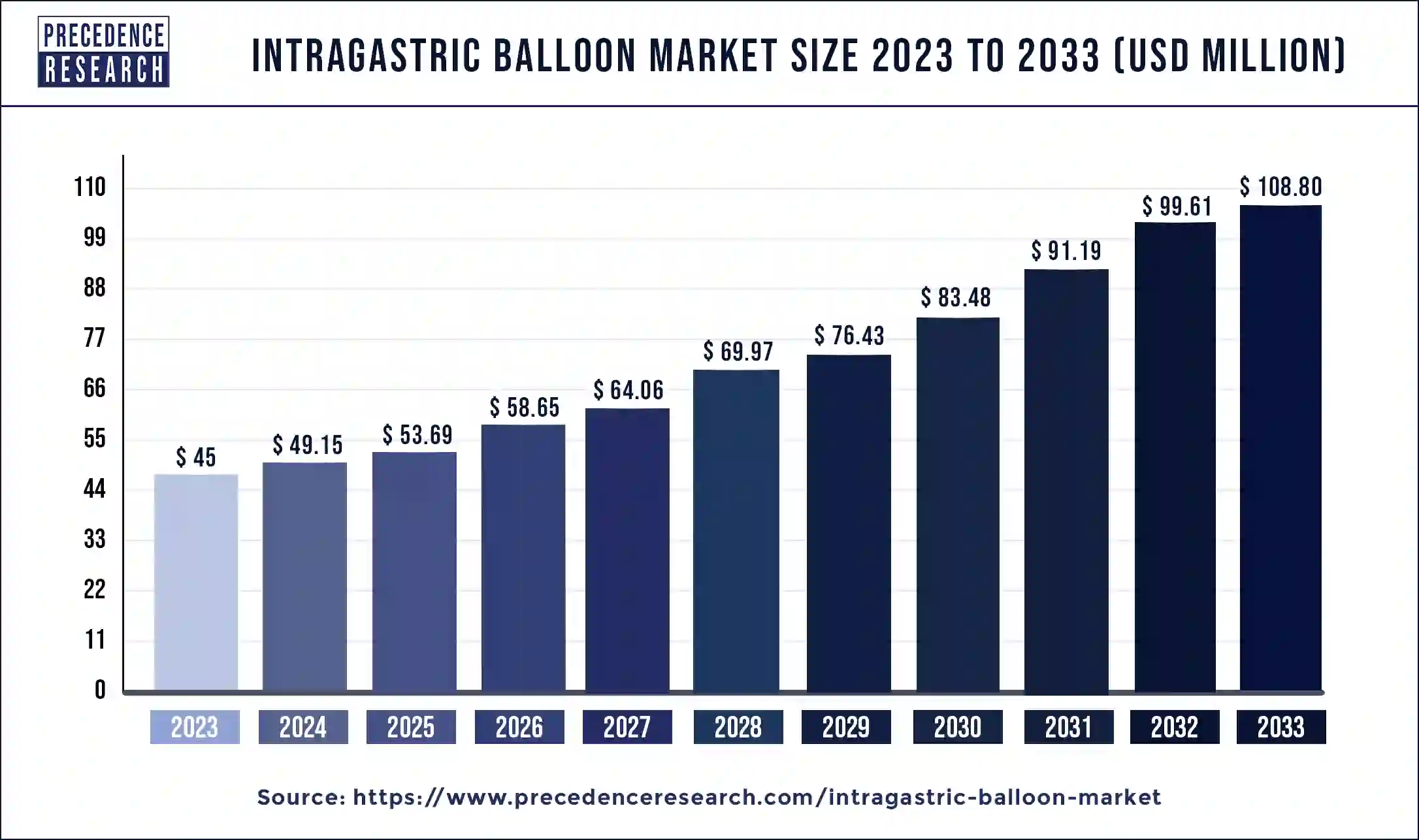The global intragastric balloon market size reached USD 45 million in 2023 and is anticipated to hit around USD 108.80 million by 2033, expanding at a CAGR of 9.22% from 2024 to 2033.

The Intragastric Balloon Market has witnessed significant growth in recent years, driven by rising obesity rates globally and an increasing emphasis on minimally invasive weight loss procedures. Intragastric balloons are non-surgical devices placed in the stomach to induce weight loss by creating a feeling of fullness, thereby reducing food intake. The market encompasses various types of intragastric balloons, including saline-filled balloons, gas-filled balloons, and dual-balloon systems. These devices offer a temporary solution for weight loss, typically remaining in the stomach for six months to one year, depending on the type.
Growth Factors:
Several factors contribute to the growth of the intragastric balloon market. One of the primary drivers is the growing prevalence of obesity worldwide. With changing lifestyles, sedentary habits, and unhealthy dietary patterns, obesity rates have soared, leading to an increased demand for effective weight loss solutions. Intragastric balloons offer a less invasive alternative to bariatric surgery, attracting individuals seeking to lose weight without undergoing major surgical procedures. Additionally, advancements in balloon technology, such as the development of durable and biocompatible materials, have enhanced the safety and efficacy of intragastric balloon placement, further fueling market growth.
Regional Insights:
The market for intragastric balloons is geographically diverse, with North America, Europe, Asia Pacific, Latin America, and the Middle East and Africa emerging as key regions. North America dominates the market, driven by a high prevalence of obesity and a well-established healthcare infrastructure supporting the adoption of novel weight loss interventions. Europe follows closely, with increasing awareness about obesity-related health risks and a growing trend towards minimally invasive procedures. The Asia Pacific region exhibits substantial growth potential, attributed to rising disposable incomes, changing dietary habits, and a surge in obesity rates in countries like China and India.
Drivers:
Several drivers propel the growth of the intragastric balloon market. One significant driver is the increasing acceptance of minimally invasive procedures among both patients and healthcare providers. Compared to traditional bariatric surgery, intragastric balloon placement involves less risk, shorter recovery times, and lower healthcare costs, making it an attractive option for weight loss. Additionally, the expanding pool of obese individuals globally, coupled with the rising awareness about the health consequences of obesity, stimulates demand for effective weight management solutions like intragastric balloons.
Opportunities:
The intragastric balloon market presents numerous opportunities for growth and innovation. Continued research and development efforts aimed at improving the safety, efficacy, and durability of intragastric balloons can open new avenues for market expansion. Moreover, collaborations between healthcare providers, device manufacturers, and regulatory agencies can streamline the approval process for intragastric balloon devices, facilitating their widespread adoption. Furthermore, expanding market reach into untapped regions and demographics through targeted marketing strategies and educational campaigns can unlock significant growth opportunities for market players.
Challenges:
Despite the promising growth prospects, the intragastric balloon market faces several challenges. One of the primary challenges is the risk of complications associated with balloon placement, such as gastric ulceration, migration, and bowel obstruction. Addressing these safety concerns requires ongoing research and development efforts to enhance device design and implantation techniques. Additionally, reimbursement limitations and regulatory hurdles in certain regions may hinder market growth by limiting patient access to intragastric balloon procedures. Moreover, competition from alternative weight loss interventions, including pharmacotherapy and surgical options, poses a challenge to market penetration and adoption.
This overview provides insights into the dynamics shaping the intragastric balloon market, highlighting its growth drivers, regional trends, opportunities, and challenges. As the prevalence of obesity continues to rise worldwide, the demand for effective and minimally invasive weight loss solutions is expected to drive further expansion of the intragastric balloon market in the coming years.
Recent Developments
- In September 2022, Allurion Technologies, the United States-based medical device manufacturer, launched its weight loss solution, a swallowable gastric balloon, in India.
Intragastric Balloon Market Companies
- Allurion Technologies
- Allergan (Acquired by Abbott)
- Apollo Endosurgery
- Reshape Medical
- Spatz FGIA
- Endalis
- Silimed
- Medsil
Segment Covered in the Report
By Balloon Type
- Single
- Dual
- Triple
By Filling Material
- Saline Filled
- Gas Filled
By Administration
- Endoscopy
- Pill Form
By End-use
- Hospitals
- Ambulatory Centers
By Geography
- North America
- Europe
- Asia-Pacific
- Latin America
- Middle East and Africa
Contact Us:
Mr. Alex
Sales Manager
Call: +1 9197 992 333
Email: sales@precedenceresearch.com
Web: https://www.precedenceresearch.com
Blog: https://www.expresswebwire.com/
Blog: https://www.uswebwire.com/


0 Comments